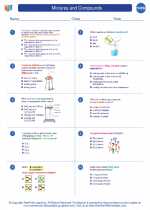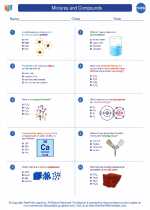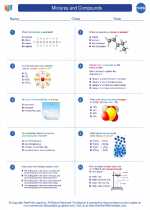Decomposition
Decomposition is a type of chemical reaction in which a single compound breaks down into two or more simpler substances. This can occur through various processes, such as heat, light, or the addition of a catalyst.
Types of Decomposition Reactions
There are several types of decomposition reactions:
- Thermal decomposition: Occurs when a compound is heated, leading to its breakdown into simpler substances.
- Electrolytic decomposition: Involves the use of electric current to break down a compound into its constituent elements.
- Photodecomposition: Takes place when a compound is exposed to light, causing it to decompose.
- Decomposition by catalyst: Involves the use of a catalyst to facilitate the decomposition of a compound.
Examples of Decomposition Reactions
Some common examples of decomposition reactions include:
- Thermal decomposition of calcium carbonate: CaCO3 → CaO + CO2
- Electrolytic decomposition of water: 2H2O → 2H2 + O2
- Photodecomposition of silver bromide: 2AgBr → 2Ag + Br2
Applications of Decomposition Reactions
Decomposition reactions have various applications in everyday life and industry, including:
- Production of oxygen through the electrolysis of water.
- Thermal decomposition of limestone to produce lime for construction and agriculture.
- Photodecomposition of light-sensitive materials in photography.
Study Tips for Decomposition
When studying decomposition reactions, it's important to:
- Understand the different types of decomposition reactions and their respective mechanisms.
- Memorize common examples of decomposition reactions and their chemical equations.
- Practice balancing chemical equations for decomposition reactions to reinforce your understanding.
- Explore real-world applications of decomposition reactions to appreciate their significance.
◂Chemistry Worksheets and Study Guides High School. Mixtures and Compounds
Worksheet/Answer key Mixtures and Compounds
Mixtures and Compounds  Worksheet/Answer key
Worksheet/Answer key Mixtures and Compounds
Mixtures and Compounds  Worksheet/Answer key
Worksheet/Answer key Mixtures and Compounds
Mixtures and Compounds 

 Worksheet/Answer key
Worksheet/Answer key
 Worksheet/Answer key
Worksheet/Answer key

The resources above cover the following skills:
Chemistry II
Properties of Matter
Develop and use models to explain the differences between chemical compounds using patterns as a method for identification.
Use mathematical representations to quantify matter through the analysis of patterns in chemical compounds.